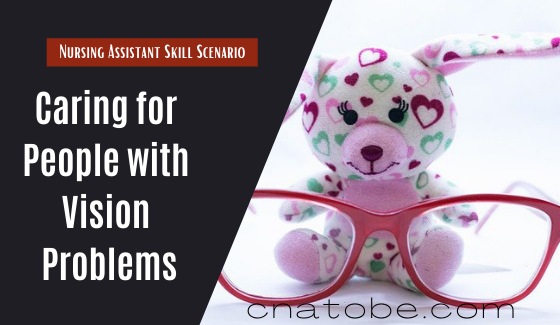
People over the age of 40 are at risk for developing certain serious vision problems. These include cataracts, glaucoma, and blindness.
Nursing home residents who have vision problems should be encouraged to wear their eyeglasses or eye contacts.
Individuals with vision problems need extra care. Make sure there is proper lightning in the room. You need to face the resident when speaking. Talk directly to the resident whom you are assisting. Do not talk to other residents or staff members. Always tell the resident what you are doing while caring for them.
Nursing Assistant Skill Scenario: Care for People with Limited Vision
Our nursing assistant online class teacher gives us the following scenario on “how to care people with vision problems.”
Here’s the scenario. . .
You work in an assisted-living facility and have known one of the residents, Mrs. Zinner, for almost 6 years now.
Mrs. Zinner is in her 70s and enjoys very good health. In fact, her only disability seems to be related to macular degeneration, which is causing her to go blind.
Mrs. Zinner’s remaining sight is limited to being able to distinguish between light and dark and the outlines of very large objects.
1. What are some ways that you can help Mrs. Zinner adjust to her blindness physically?
2. What are some things that will help Mrs. Zinner emotionally?
Response and Discussion
Here are my responses to the scenario. . .
1. What are some ways that you can help Mrs. Zinner adjust to her blindness physically?
When I need to talk to her I need to make sure that there’s plenty of lights on my face. I will use the imaginary clock to tell her the position or location of things around her room.
2. What are some things that will help Mrs. Zinner emotionally?
I will visit Mrs. Zinner often times. I will ask her about her life experiences, work/ profession, family, church, places she visited, and her childhood.